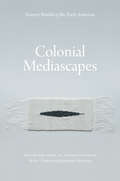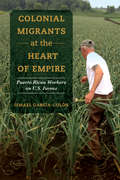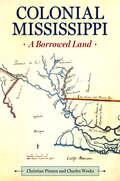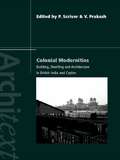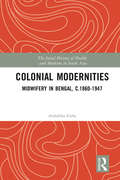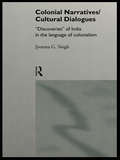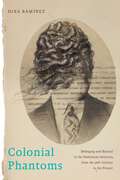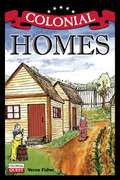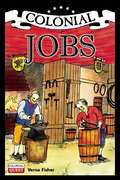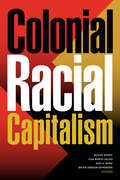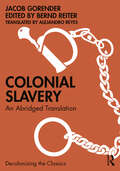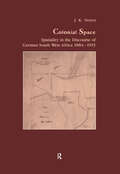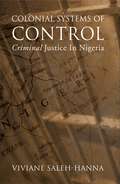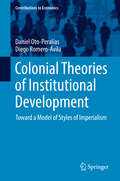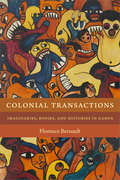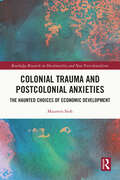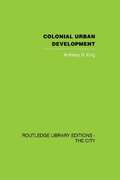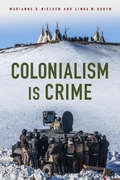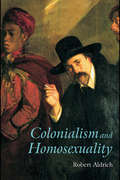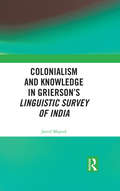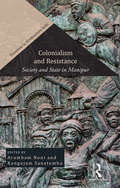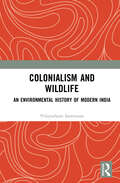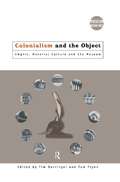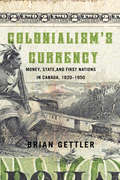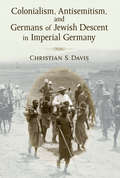- Table View
- List View
Colonial Mediascapes: Sensory Worlds of the Early Americas
by Matt Cohen Jeffrey GloverIn colonial North and South America, print was only one way of communicating. Information in various forms flowed across the boundaries between indigenous groups and early imperial settlements. Natives and newcomers made speeches, exchanged gifts, invented gestures, and inscribed their intentions on paper, bark, skins, and many other kinds of surfaces. No one method of conveying meaning was privileged, and written texts often relied on nonwritten modes of communication. Colonial Mediascapes examines how textual and nontextual literatures interacted in colonial North and South America. Extending the textual foundations of early American literary history, the editors bring a wide range of media to the attention of scholars and show how struggles over modes of communication intersected with conflicts over religion, politics, race, and gender. This collection of essays by major historians, anthropologists, and literary scholars demonstrates that the European settlement of the Americas and European interaction with Native peoples were shaped just as much by communication challenges as by traditional concerns such as religion, economics, and resources.
Colonial Migrants at the Heart of Empire: Puerto Rican Workers on U.S. Farms (American Crossroads #57)
by Ismael García-ColónColonial Migrants at the Heart of Empire is the first in-depth look at the experiences of Puerto Rican migrant workers in continental U.S. agriculture in the twentieth century. The Farm Labor Program, established by the government of Puerto Rico in 1947, placed hundreds of thousands of migrant workers on U.S. farms and fostered the emergence of many stateside Puerto Rican communities. Ismael García-Colón investigates the origins and development of this program and uncovers the unique challenges faced by its participants.A labor history and an ethnography, Colonial Migrants evokes the violence, fieldwork, food, lodging, surveillance, and coercion that these workers experienced on farms and conveys their hopes and struggles to overcome poverty. Island farmworkers encountered a unique form of prejudice and racism arising from their dual status as both U.S. citizens and as "foreign others," and their experiences were further shaped by evolving immigration policies. Despite these challenges, many Puerto Rican farmworkers ultimately chose to settle in rural U.S. communities, contributing to the production of food and the Latinization of the U.S. farm labor force.
Colonial Mississippi: A Borrowed Land (Heritage of Mississippi Series)
by Christian Pinnen Charles WeeksColonial Mississippi: A Borrowed Land offers the first composite of histories from the entire colonial period in the land now called Mississippi. Christian Pinnen and Charles Weeks reveal stories spanning over three hundred years and featuring a diverse array of individuals and peoples from America, Europe, and Africa. The authors focus on the encounters among these peoples, good and bad, and the lasting impacts on the region.The eighteenth century receives much-deserved attention from Pinnen and Weeks as they focus on the trials and tribulations of Mississippi as a colony, especially along the Gulf Coast and in the Natchez country. The authors tell the story of a land borrowed from its original inhabitants and never returned. They make clear how a remarkable diversity characterized the state throughout its early history.Early encounters and initial contacts involved primarily Native Americans and Spaniards in the first half of the sixteenth century following the expeditions of Columbus and others to the large region of the Gulf of Mexico. More sustained interaction began with the arrival of the French to the region and the establishment of a French post on Biloxi Bay at the end of the seventeenth century. Such exchanges continued through the eighteenth century with the British, and then again the Spanish until the creation of the territory of Mississippi in 1798 and then two states, Mississippi in 1817 and Alabama in 1819. Though readers may know the bare bones of this history, the dates, and names, this is the first book to reveal the complexity of the story in full, to dig deep into a varied and complicated tale.
Colonial Modernities: Building, Dwelling and Architecture in British India and Ceylon (Architext)
by Vikramaditya Prakash Peter ScriverA carefully crafted selection of essays from international experts, this book explores the effect of colonial architecture and space on the societies involved – both the colonizer and the colonized. Focusing on British India and Ceylon, the essays explore the discursive tensions between the various different scales and dimensions of such 'empire-building' practices and constructions. Providing a thorough exploration of these tensions, Colonial Modernities challenges the traditional literature on the architecture and infrastructure of the former European empires, not least that of the British Indian 'Raj'. Illustrated with seventy-five halftone images, it is a fascinating and thoroughly grounded exposition of the societal impact of colonial architecture and engineering.
Colonial Modernities: Midwifery in Bengal, c.1860–1947 (The Social History of Health and Medicine in South Asia)
by Ambalika GuhaThe subject of medicalisation of childbirth in colonial India has so far been identified with three major themes: the attempt to reform or ‘sanitise’ the site of birthing practices, establishing lying-in hospitals and replacing traditional birth attendants with trained midwives and qualified female doctors. This book, part of the series The Social History of Health and Medicine in South Asia, looks at the interactions between childbirth and midwifery practices and colonial modernities. Taking eastern India as a case study and related research from other areas, with hard empirical data from local government bodies, municipal corporations and district boards, it goes beyond the conventional narrative to show how the late nineteenth-century initiatives to reform birthing practices were essentially a modernist response of the western-educated colonised middle class to the colonial critique of Indian sociocultural codes. It provides a perceptive historical analysis of how institutionalisation of midwifery was shaped by the debates on the women’s question, nationalism and colonial public health policies, all intersecting in the interwar years. The study traces the beginning of medicalisation of childbirth, the professionalisation of obstetrics, the agency of male doctors, inclusion of midwifery as an academic subject in medical colleges and consequences of maternal care and infant welfare. This book will greatly interest scholars and researchers in history, social medicine, public policy, gender studies and South Asian studies.
Colonial Narratives/Cultural Dialogues: 'Discoveries' of India in the Language of Colonialism
by Jyotsna SinghColonial Narratives/Cultural Dialogues demonstrates the continuing validity of the colonial paradigm as it maps the geographical, political, and imaginative space of 'India/Indies' from the seventeenth century to the present. Breaking new ground in postcolonial studies, Jyotsna Singh highlights the interconnections among early modern colonial encounters, later manifestations in the Raj and their lingering influence in the postcolonial Indian nationalist state. Singh challenges the assumption of eye-witness accounts and unmeditated experiences implcit in colonial representational practices, and often left unchallenged in the postcolonial era. Essential introductory reading for students and academics, Colonial Narratives/Cultural Dialogues re-evaluates the following texts: * seventeenth century travel narratives about India * eighteenth century 'nabob' texts * letters of the Orientalist, Sir William Jones * reviews of Shakespearean productions in Calcutta and postcolonial Indo-Anglian novels
Colonial Phantoms: Belonging and Refusal in the Dominican Americas, from the 19th Century to the Present (Nation of Nations #28)
by Dixa RamírezWinner, 2019 Isis Duarte Book Prize, given by the Haiti/Dominican Republic Section of the Latin American Studies AssociationWinner, 2019 Barbara Christian Literary Award, given by the Caribbean Studies AssociationHighlights the histories and cultural expressions of the Dominican people Using a blend of historical and literary analysis, Colonial Phantoms reveals how Western discourses have ghosted—miscategorized or erased—the Dominican Republic since the nineteenth century despite its central place in the architecture of the Americas. Through a variety of Dominican cultural texts, from literature to public monuments to musical performance, it illuminates the Dominican quest for legibility and resistance. Dixa Ramírez places the Dominican people and Dominican expressive culture and history at the forefront of an insightful investigation of colonial modernity across the Americas and the African diaspora. In the process, she untangles the forms of free black subjectivity that developed on the island. From the nineteenth century national Dominican poet Salomé Ureña to the diasporic writings of Julia Alvarez, Chiqui Vicioso, and Junot Díaz, Ramírez considers the roles that migration, knowledge production, and international divisions of labor have played in the changing cultural expression of Dominican identity. In doing so, Colonial Phantoms demonstrates how the centrality of gender, race, and class in the nationalisms and imperialisms of the West have profoundly impacted the lives of Dominicans. Ultimately, Ramírez considers how the Dominican people negotiate being left out of Western imaginaries and the new modes of resistance they have carefully crafted in response.
Colonial Quest: Colonial Homes
by Verna FisherTaking young readers on a journey back in time, this dynamic new series showcases various aspects of colonial life, from people and clothing to homes and food. Each book contains creative illustrations, interesting facts, highlighted vocabulary words, end-of-book challenges, and sidebars that help children understand the differences between modern and colonial life and inspire them to imagine what it would have been like to grow up in colonial America. The volumes in this series focus on the colonists but also include relevant information about Native Americans, offering a variety of perspectives on life in the colonies.
Colonial Quest: Colonial Jobs
by Verna FisherTaking young readers on a journey back in time, this dynamic new series showcases various aspects of colonial life, from people and clothing to homes and food. Each book contains creative illustrations, interesting facts, highlighted vocabulary words, end-of-book challenges, and sidebars that help children understand the differences between modern and colonial life and inspire them to imagine what it would have been like to grow up in colonial America. The volumes in this series focus on the colonists but also include relevant information about Native Americans, offering a variety of perspectives on life in the colonies. Discussing the various products made by colonists--from flour and iron horseshoes to wooden buckets and furniture--this engaging guidebook teaches young readers about the different craftsmen of the era, including blacksmiths, coppers, and millers. Additional attention is also paid to the goods produced by Native Americans, including leather moccasins and woven baskets, and how these goods were exchanged in a barter economy.
Colonial Racial Capitalism
by Etal. Susan KoshyThe contributors to Colonial Racial Capitalism consider anti-Blackness, human commodification, and slave labor alongside the history of Indigenous dispossession and the uneven development of colonized lands across the globe. They demonstrate the co-constitution and entanglement of slavery and colonialism from the conquest of the New World through industrial capitalism to contemporary financial capitalism. Among other topics, the essays explore the historical suturing of Blackness and Black people to debt, the violence of uranium mining on Indigenous lands in Canada and the Belgian Congo, how municipal property assessment and waste management software encodes and produces racial difference, how Puerto Rican police crackdowns on protestors in 2010 and 2011 drew on decades of policing racially and economically marginalized people, and how historic sites in Los Angeles County narrate the Mexican-American War in ways that occlude the war’s imperialist groundings. The volume’s analytic of colonial racial capitalism opens new frameworks for understanding the persistence of violence, precarity, and inequality in modern society.Contributors. Joanne Barker, Jodi A. Byrd, Lisa Marie Cacho, Michael Dawson, Iyko Day, Ruth Wilson Gilmore, Alyosha Goldstein, Cheryl I. Harris, Kimberly Kay Hoang, Brian Jordan Jefferson, Susan Koshy, Marisol LeBrón, Jodi Melamed, Laura Pulido
Colonial Slavery: An Abridged Translation (Decolonizing the Classics)
by Jacob GorenderJacob Gorender's (1923–2013) 1978 book, Colonial Slavery (O Escravismo Colonial), comes alive for English language readers thanks to Bernd Reiter and Alejandro Reyes's brilliant translation. Gorender argued that slave-holding societies produced an economic system sui generis, not fitting into any of the established societal categories offered by Karl Marx and Max Weber. As such, Gorender proposed a theory of colonial slavery as the structuring force of slave-holding societies. For him, slave-holding societies are different from other societies in that slavery structured them differently. This is of the utmost relevance to this day as it allows for a new and different way to explain contemporary racial inequalities in post-slavery societies. An accomplished interpreter of Brazilian social formation, Gorender was motivated by the need to understand the historical roots of class domination and the emergence of Brazilian capitalist society. His presentation of rich historical data, rigorous theoretical and analytical framework, and militant action as an active member of the Brazilian Communist Party are the hallmarks of his writing. Colonial Slavery: An Abridged Translation is a must-read for researchers, teachers, and students of history, sociology, economics, politics, as well as activists of the Black movement and other movements committed to anti-racism.
Colonial Space: Spatiality in the Discourse of German South West Africa 1884-1915 (Studies in Anthropology and History)
by J.K. NoyesFirst Published in 1992. This book is about space of a colony and how it was produced. It began as a study of the literature of the German colony of South-West Africa between the years 1884 and 1915. The author’s aim is to demonstrate the active role which literature had played in structuring the experience of the colony. If it could be shown that literature not only describes, but also helps to structure the forms of experience, then it would follow that it also plays an important role in structuring the experience of colonization, and hence the form of the colony itself. From the outset, therefore, the study was concerned with a number of issues centering around colonization, representation, experience, and social form, where spatiality is the concept which allows us to understand how these various aspects of colonialism interrelate.
Colonial Systems of Control: Criminal Justice in Nigeria (Alternative Perspectives in Criminology)
by Viviane Saleh-HannaA pioneering book on prisons in West Africa, Colonial Systems of Control: Criminal Justice in Nigeria is the first comprehensive presentation of life inside a West African prison. Chapters by prisoners inside Kirikiri maximum security prison in Lagos, Nigeria are published alongside chapters by scholars and activists. While prisoners document the daily realities and struggles of life inside a Nigerian prison, scholar and human rights activist Viviane Saleh-Hanna provides historical, political, and academic contexts and analyses of the penal system in Nigeria. The European penal models and institutions imported to Nigeria during colonialism are exposed as intrinsically incoherent with the community-based conflict-resolution principles of most African social structures and justice models. This book presents the realities of imprisonment in Nigeria while contextualizing the colonial legacies that have resulted in the inhumane brutalities that are endured on a daily basis. Published in English.
Colonial Theories of Institutional Development
by Diego Romero-Ávila Daniel Oto-PeralíasThis book analyzes the role played by initial endowments and colonizer identity in seeking to explain institutional development in former colonies. It presents a model of two styles of imperialism that integrates the colonial origin and endowment views explaining current institutions. The authors argue that Great Britain and Portugal adopted an ‘economically-oriented’ style, which was pragmatic and sensitive to initial conditions. For this style of imperialism the endowment view is applicable. In contrast, France employed a ‘politically-oriented’ style of imperialism, in which ideological and political motivations were more present. This led to a uniform colonial policy that largely disregarded initial endowments. In turn, the case of Spain represents a hybrid of the two models. The empirical analysis presented here reveals a remarkable degree of heterogeneity in the relationship of endowments and colonizer identity with current institutions.
Colonial Transactions: Imaginaries, Bodies, and Histories in Gabon (Theory in Forms)
by Florence BernaultIn Colonial Transactions Florence Bernault moves beyond the racial divide that dominates colonial studies of Africa. Instead, she illuminates the strange and frightening imaginaries that colonizers and colonized shared on the ground. Bernault looks at Gabon from the late nineteenth century to the present, historicizing the most vivid imaginations and modes of power in Africa today: French obsessions with cannibals, the emergence of vampires and witches in the Gabonese imaginary, and the use of human organs for fetishes. Struggling over objects, bodies, agency, and values, colonizers and colonized entered relations that are better conceptualized as "transactions." Together they also shared an awareness of how the colonial situation broke down moral orders and forced people to use the evil side of power. This foreshadowed the ways in which people exercise agency in contemporary Africa, as well as the proliferation of magical fears and witchcraft anxieties in present-day Gabon. Overturning theories of colonial and postcolonial nativism, this book is essential reading for historians and anthropologists of witchcraft, power, value, and the body.
Colonial Trauma and Postcolonial Anxieties: The Haunted Choices of Economic Development (Routledge Research on Decoloniality and New Postcolonialisms)
by Maureen SiohColonial Trauma and Postcolonial Anxieties argues that economic decisions reflect unconscious anxieties about survival and dignity experienced in a cycle of repeat trauma tracing back to the original trauma of loss in colonialism.Readers will understand how emerging economies evaluate the costs and benefits of key economic policies in the postcolonial era using a psychoanalytical framework.While there are psychoanalytic studies of the economy and finance from a western perspective, there have been no sustained psychoanalytic studies from the perspective of East Asian economies, the fastest growing in the world. Scholars will also find the methodology combining archival research with and field studies, including rare interviews with senior decision-makers useful in their own research since it is rare to find studies of social theory that are empirically rich.This book will be of interest to policymakers and scholars of political economy, international development, human geography, postcolonial studies, psychoanalysis, and area studies (Southeast and East Asia). The book can also be used as a text for graduate and upper level university courses.
Colonial Urban Development: Culture, Social Power and Environment
by Anthony D. KingThe Study focuses on the social and, more especially, the cultural processes governing colonial urban development and develops a theory and methodology to do this. The author demonstrates how the physical and spatial arrangements characterizing urban development are unique products of a particular society, to be understood only in terms of its values, behaviour and institutions and the distribution of social and political power within it. Nowhere is this more apparent than in 'colonial cities' of Asia and Africa where the environmental assumptions of a dominant, industrializing Western power were introduced to largely 'pre-industrial' societies. Anthony King draws his material primarily from these areas, and includes a case study of the development of colonial Delhi from the early nineteenth century to 1947. Yet, as the author explains, the problems of how cultural social and political factors influence the nature of environments and how these in turn affect social processes and behaviour, are of global significance. This book was first published in 1976.
Colonialism Is Crime (Critical Issues in Crime and Society)
by Marianne Nielsen Linda M. RobynThere is powerful evidence that the colonization of Indigenous people was and is a crime, and that that crime is on-going. Achieving historical colonial goals often meant committing acts that were criminal even at the time. The consequences of this oppression and criminal victimization is perhaps the critical factor explaining why Indigenous people today are overrepresented as victims and offenders in the settler colonist criminal justice systems. This book presents an analysis of the relationship between these colonial crimes and their continuing criminal and social consequences that exist today. The authors focus primarily on countries colonized by Britain, especially the United States. Social harm theory, human rights covenants, and law are used to explain the criminal aspects of the historical laws and their continued effects. The final chapter looks at the responsibilities of settler-colonists in ameliorating these harms and the actions currently being taken by Indigenous people themselves.
Colonialism and Homosexuality
by Robert AldrichColonialism and Homosexuality is a thorough investigation of the connections of homosexuality and imperialism from the late 1800s - the era of 'new imperialism' - until the era of decolonization. Robert Aldrich reconstructs the context of a number of liaisons, including those of famous men such as Cecil Rhodes, E.M. Forster or André Gide, and the historical situations which produced both the Europeans and their non-Western lovers. Colonial lands, which in the late nineteenth and early twentieth century included most of Africa, South and Southeast Asia and the islands of the Pacific and Indian Oceans and the Caribbean, provided a haven for many Europeans whose sexual inclinations did not fit neatly into the constraints of European society. Each of the case-studies is a micro-history of a particular colonial situation, a sexual encounter, and its wider implications for cultural and political life. Students both of colonial history, and of gender and queer studies, will find this an informative read.
Colonialism and Knowledge in Grierson’s Linguistic Survey of India
by Javed MajeedThis book is the first detailed examination of George Abraham Grierson’s Linguistic Survey of India, one of the most complete sources on South Asian languages. It shows that the Survey was characterised by a composite and collaborative mode of producing knowledge, which undermines any clear distinctions between European orientalists and colonised Indians in British India. Its authority lay more in its stress on the provisional nature of its findings, an emphasis on the approximate nature of its results, and a strong sense of its own shortcomings and inadequacies, rather than in any expression of mastery over India’s languages. The book argues that the Survey brings to light a different kind of colonial knowledge, whose relationship to power was much more ambiguous than has hitherto been assumed for colonial projects in modern India. It also highlights the contribution of Indians to the creation of colonial knowledge about South Asia as a linguistic region. Indians were important collaborators and participants in the Survey, and they helped to create the monumental knowledge of India as a linguistic region which is embodied in the Survey. This volume, like its companion volume Nation and Region in Grierson’s Linguistic Survey of India, will be a great resource for scholars and researchers of linguistics, language and literature, history, political studies, cultural studies and South Asian studies.
Colonialism and Resistance: Society and State in Manipur (Transition in Northeastern India)
by Arambam Noni Kangujam SanatombaPart of the ‘Transition in Northeastern India’ series, this volume critically explores how Northeast India, especially Manipuri society, responded to colonial rule. It studies the interplay between colonialism and resistance to provide an alternative understanding of colonialism on the one hand, and society and state formation on the other. Challenging dominant histories of the area, the essays provide significant insights into understanding colonialism and its multiple effects on economy, polity, culture, and faith system. It examines hitherto untouched areas in the study of Northeast, and discusses how social movements are augmented, constituted or sustained. This book will be of great interest to researchers and scholars of modern history, sociology and social anthropology, particularly those concerned with Northeast India.
Colonialism and Wildlife: An Environmental History of Modern India
by Velayutham SaravananThis book delves into the history of the commercialization of wildlife in India. It examines the colonial strategies that were employed in the commodification of wildlife resources specifically for lucrative domestic and international trade during the early nineteenth to the mid-twentieth century. It looks at how and why the colonial administration paid special emphasis on hunting and game sports which largely contributed to commodity capitalism in the form of taxidermy and wildlife exports. The author also critically analyses the wildlife laws and regulations promulgated by the colonial administration, such as the elephant protection act, birds and fisheries act, the forest acts, and studies how they have systematically brought wildlife under state control with a commercial motive. An important contribution to the environmental history of India, this book is an essential interdisciplinary resource for scholars and researchers of history, colonialism, wildlife studies, economic history, ecological studies, environmental history, Indian history, South Asian studies, and development studies.
Colonialism and the Object: Empire, Material Culture and the Museum (Museum Meanings)
by Tom Flynn Tim BarringerDrawing together an international group of scholars from a variety of disciplinary and cultural backgrounds, Colonialism and the Object explores the impact of colonial contact with other cultures on the material culture of both the colonized and the imperial nation. The book includes intensive case-studies of objects from India, Pakistan, New Zealand, China and Africa, all of which were collected by, or exhibited in, the institutions of the British Empire, and key chapters address issues of radical identity across cultural barriers, and the hybird styles of objects which can emerge when cultures meet. Colonialism and the Object is essential reading for all those interested in post-colonial theory, museum studies, material culture and design history.
Colonialism's Currency: Money, State, and First Nations in Canada 1820-1950 (Studies on the History of Quebec/Études d'histoire du Québec)
by Brian GettlerMoney, often portrayed as a straightforward representation of market value, is also a political force, a technology for remaking space and population. This was especially true in nineteenth- and twentieth-century Canada, where money - in many forms - provided an effective means of disseminating colonial social values, laying claim to national space, and disciplining colonized peoples. Colonialism's Currency analyzes the historical experiences and interactions of three distinct First Nations - the Wendat of Wendake, the Innu of Mashteuiatsh, and the Moose Factory Cree - with monetary forms and practices created by colonial powers. Whether treaty payments and welfare provisions such as the paper vouchers favoured by the Department of Indian Affairs, the Canadian Dominion's standardized paper notes, or the "made beaver" (the Hudson's Bay Company's money of account), each monetary form allowed the state to communicate and enforce political, economic, and cultural sovereignty over Indigenous peoples and their lands. Surveying a range of historical cases, Brian Gettler shows how currency simultaneously placed First Nations beyond the bounds of settler society while justifying colonial interventions in their communities. Testifying to the destructive and the legitimizing power of money, Colonialism's Currency is an intriguing exploration of the complex relationship between First Nations and the state.
Colonialism, Antisemitism, and Germans of Jewish Descent in Imperial Germany
by Christian S. DavisColonialism, Antisemitism, and Germans of Jewish Descent in Imperial Germany examines the relationship between the colonial and antisemitic movements of modern Germany from 1871 to 1918, examining the complicated ways in which German antisemitism and colonialism fed off of and into each other in the decades before the First World War. Author Christian S. Davis studies the significant involvement with and investment in German colonialism by the major antisemitic political parties and extra-parliamentary organizations of the day, while also investigating the prominent participation in the colonial movement of Jews and Germans of Jewish descent and their tense relationship with procolonial antisemites. Working from the premise that the rise and propagation of racial antisemitism in late-nineteenth-century Germany cannot be separated from the context of colonial empire,Colonialism, Antisemitism, and Germans of Jewish Descent in Imperial Germanyis the first work to study the dynamic and evolving interrelationship of the colonial and antisemitic movements of the Kaiserreich era. It shows how individuals and organizations who originated what would later become the ideological core of National Socialism---racial antisemitism---both influenced and perceived the development of a German colonial empire predicated on racial subjugation. It also examines how colonialism affected the contemporaneous German antisemitic movement, dividing it over whether participation in the nationalist project of empire building could furnish patriotic credentials to even Germans of Jewish descent. The book builds upon the recent upsurge of interest among historians of modern Germany in the domestic impact and character of German colonialism, and on the continuing fascination with the racialization of the German sense of self that became so important to German history in the twentieth century.
